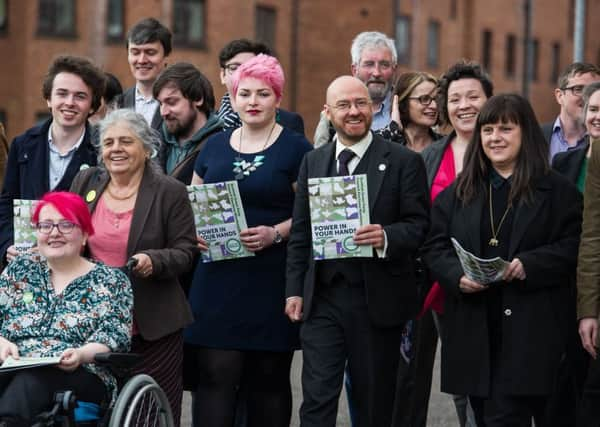Dominic Hinde: Financial limitations behind Green decision


When the Greens announced they would only be contesting three seats at next month's general election, supporters and critics alike were quick to ask how they expect to be taken seriously.
In the past two years the Greens have come on leaps and bounds in Scotland, thanks to a surge in membership and a voting system at Holyrood and in local councils that makes it easier for new voices to enter politics.
Advertisement
Hide AdAdvertisement
Hide AdHaving just fought a Holyrood campaign where there was no sign a of a ‘Yes alliance’ and a local election campaign with some small gains, the Greens had expected to have a few years to raise more money.
The pro-independence press has talked enthusiastically about them working with the SNP, but the SNP seemingly have little interest in giving the Greens any space at all.
Precious little of that Yes supporting money has found its way into the Green bank account.
When Scotland copied the German election system at Holyrood’s inception, it failed to copy the public subsidy provided to parties as a baseline way to help them engage with voters.
Unfortunately for the Greens, they are the only major party in Scottish politics without any big private or public donors.
Labour can still bank on the trade unions, and the Tories and Lib Dems have no shortage of private capital, but the Greens have to crowdfund for every poll.
The SNP meanwhile have over 100,000 members who can whip out their cheque books, and an operating budget of millions of pounds each year.
Advertisement
Hide AdAdvertisement
Hide AdEven UKIP, despite having almost no activist base in Scotland, were able to call on some very rich donors to elect David Coburn and campaign in the Brexit referendum.
The Greens have in the past turned down large private donations on principle, and as the Conservatives and Scottish Liberal Democrats have shown spending limits can be bypassed with some creative maths.
The reason the Lib Dems could win a constituency in Edinburgh at Holyrood was that they pumped huge amounts of money into Alex Cole-Hamilton’s campaign.
The Greens, in an attempt to do politics openly, have paid the price of idealism in an electoral system highly dependent on private money and huge party machines.
In the past they have also shot themselves in the foot, and often failed to explain in the media what they are attempting to bring to the table.
The internal structures of the party date from when it was merely a few hundred strong and rely on direct democracy, carrying out internal elections for almost every position.
This has in the past resulted in a communications impasse, as well as major decisions being made by people with little strategic experience or knowledge of the political and media worlds.
According to party insiders, the logic of only standing three candidates is to devote what scant resources the party have towards areas they think they might do well in in the next Holyrood election.
Advertisement
Hide AdAdvertisement
Hide AdThe party also knows that many of its voters would rather not risk allowing a Conservative to come up the middle and will hold their noses to vote SNP or Labour under first past the post.
Even if the Greens were to poll six or seven per cent in the general election, there is no chance of that turning into the four Scottish MPs their vote share proportionally represents.
The choice facing Patrick Harvie and his party in the surprise Westminster poll is not a pleasant one.
They have to either commit financial suicide to keep the cameras happy, or invest sensibly and give their activists a break with a view towards the possibility of another independence referendum.
In Westminster politics, cash is king.
• Dominic Hinde is a European and environmental journalist, and the author of the book ‘A Utopia like Any Other: Inside the Swedish Model’
